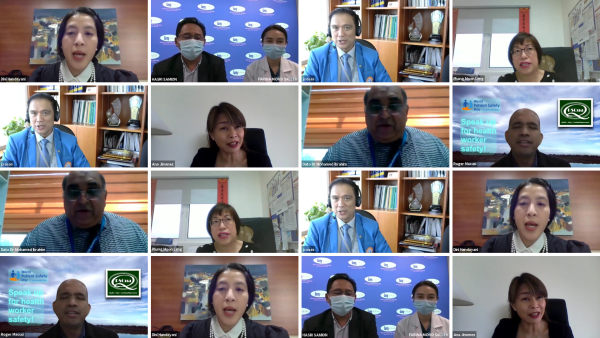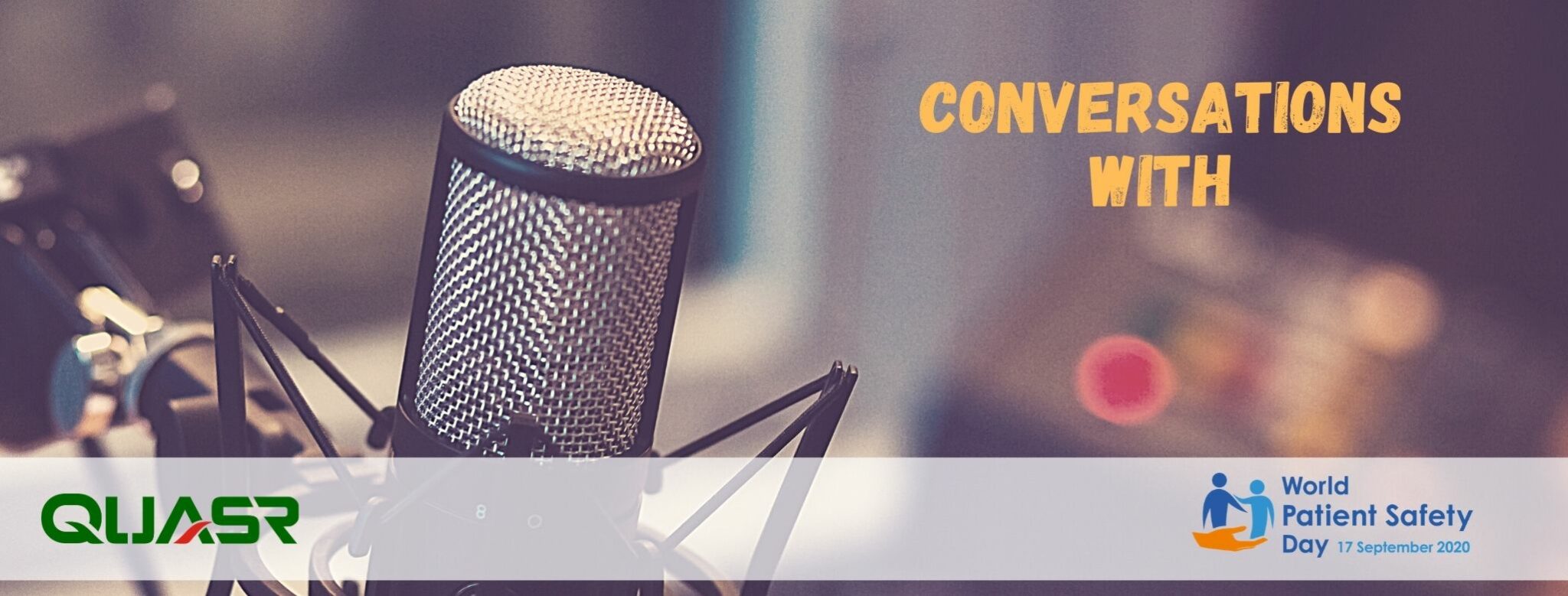In conjunction with World Patient Safety Day 2020, QUASR is organising a series of interviews with healthcare leaders to share their thoughts and to join the call for action to protect and support health workers.
Dr. Roger Macusi is a member of the Board of Trustees of the Philippine Society for Quality in Healthcare (PSQua) and the Chairman of its Publications and Public Relations Committee. He is a Medical Physician, has a Masters’ Degree in Hospital Administration, and has been involved in various leadership capacities with a number of hospitals and healthcare organizations.
As an officer of PSQua, which advocates for continual improvement in quality and safety in healthcare, he is very much involved with the promotion of both patient and health worker safety, in the country. Through PSQua’s national initiatives, in collaboration with both the government and the private sectors, such as the conduct of training workshops, seminars, conventions, scientific fora, Continual Quality Improvement Studies competitions, certification of health professionals in quality management, he is able to further his personal advocacy of ensuring healthcare quality and safety in the Philippines. Dr Macusi is passionate about teaching and mentoring. He loves nature and endeavours to keeps himself fit by running.

In an interview with Hak Yek Tan, Founder & CEO of QUASR, Dr. Macusi speaks about PSQua’s roles in patient safety, the impact of the Covid-19 pandemic on the healthcare industry, why education is the key in raising awareness on health worker safety, and positive mindset changes emerging from the prevailing health crisis.
We take this opportunity to thank Dr Macusi for sharing his insightful thoughts.
Here is an excerpt from the video interview with Dr Roger Macusi
What follows are excerpts and highlights of the interview.
On World Patient Safety Day theme
Sharing his thoughts on this year’s WPSD theme “Health Worker Safety: A Priority for Patient Safety”, Dr Macusi feels that it is a timely reminder of the responsibility of healthcare facilities management to ensure resources are allocated for the necessary infrastructure, equipment and supplies and enabling processes. Viewing patient safety as a result of health worker safety is not only wise but is also very logical. In fact, we cannot ensure patient safety without establishing safety protocols for health workers’ welfare.
The phrase “primum non nocere” meaning “first, do no harm”, which always refers to patients, has taken on another perspective. It can after all, be applicable to health workers as well.
Roles of health workers
Healthcare is a high risk, high demand and high stress industry. There is a general perception that many hospitals tend to focus more on patient safety and less on staff safety. On this, Dr Macusi’s view is that healthcare institutions tend to look at health workers as paid individuals who know the risks involved and are aware of their roles and responsibilities. On the other hand, patients are customers. It is always customers first and patient safety first. This mindset might have contributed to some neglect on staff safety. What needs to be explained is that patient safety is closely linked to staff safety.
At the same time, the mindset of most health workers is to prioritise patient welfare, to report incidents involving patients while ignoring or not prioritising their own personal safety. Dr Macusi thinks it all starts with education. Medical students are educated that ‘patients always come first’. Importance is always given to the patients. It is ingrained in healthcare professionals’ trainings that patients come first, and patients are primary and should always be looking after. As a result, in most healthcare settings, everything is centred towards patients and their welfare, so much so that health worker safety is not very much discussed in the educational setting. To change this, Dr Macusi suggests that we should start with education.
I will propose to our Society to look into tapping the educational institutions to teach this early, so that when the students become healthcare professionals, they know that health worker safety is important and very much linked to patient safety.
Health workers also need to understand that they have an important role to play in their own safety and the safety of other staff, not just the safety of patients. Whatever happens to health workers will have an impact on their patients, be it caused by fatigue, burnout or mental stress. They should recognise it as an issue and a risk to their patients, and to provide feedback to the management about their well-being and seek help when needed.
Roles of management
Dr Macusi stresses that hospital management plays a vital role in establishing a strong safety culture. During this pandemic, transparent and effective communication between management and staff is one of the key elements in managing staff safety and wellbeing. Ensuring open communication with staff, making sure that the staff have time for breaks to rest and call their families, short meetings and huddles to discuss staff concerns and giving them assurances can be a big help to staff who are already overworked and under emotional distress.
During this pandemic, management must take additional steps to help alleviate workplace safety risks that staff are facing and are worried about. The most critical safety risks facing health workers currently are the risks of mortality and morbidity. Out of the 314,000 Covid-19 cases in the Philippines (data as of 1st October), about 3% are health workers. The other major risks are inadequate personnel protective equipment (PPE), work overload and poor infection controls, which all contribute to emotional distress and burnout. The emotional distress health workers are facing are rooted on the fear of being exposed to the virus and getting infected, and then spread it to family members at home. Management can help by ensuring PPE and safety measures are in place, having effective communication and constantly giving assurances.
Emergency preparedness
This pandemic has highlighted a few important reminders to the healthcare community at large. One of which is the importance of having emergency preparedness plans as well as the increasingly vital role technology plays.
During this crisis, some hospitals in the Philippines were able to respond quickly and well mainly because they have emergency response systems in place. This comes from having continual improvement of quality and safety programmes in these organisations.
This is a wake-up call for healthcare institutions that they need to be better prepared for crisis.
Dr Macusi remarks that to further advance healthcare quality and safety in the Philippines, PSQua is considering to include emergency preparedness as a new training module in the near future, so that healthcare institutions are better prepared for any eventuality, especially a pandemic or an outbreak.
Paying tributes to health workers
In the Philippines, most of the tributes to health workers for their dedication and sacrifices are through songs. Some of the songs are specifically created during this crisis such as a Filipino song titled “Love will heal the world”. The use of social media is optimised in paying tributes to Filipino health workers who exhibited heroism. Doctors and nurses at the frontline who succumbed to the virus were given special tributes through songs in social media and TV in recognition of their contributions in combating the pandemic.
Technology and telehealth
Dr Macusi thinks that an acceleration in the adoption of IT innovations in healthcare is inevitable. Technology has empowered individuals, both patients and health workers through hand-held or portable devices. Data is collected, transmitted, processed, and used to make healthcare decisions at dizzying speed. Globally, it is estimated that 50 billion devices are already connected to the internet and many of these devices are tracking individual health data. IT innovation is already changing healthcare delivery in several ways, such as reaching people wherever they are in their health journey, identifying when people are at risk and knowing what they need before they need it, and by designing personal interventions and deploying them at a timely manner, predictively. Technology has positive impact on healthcare in terms of better performance, customer experience and better health outcomes and it will only accelerate from here.
In closing, Dr Macusi says this pandemic has placed a spotlight on health workers and fast-tracked our understanding and appreciation of health worker safety. We have gained valuable knowledge on how we can better protect and support our health workers, the importance of emergency preparedness and response plans and the critical part played by hospital management systems and continual quality improvement programmes. Above all, the lessons learned during this health crisis will go a long way in raising awareness on health worker safety as the foundation for patient safety.



